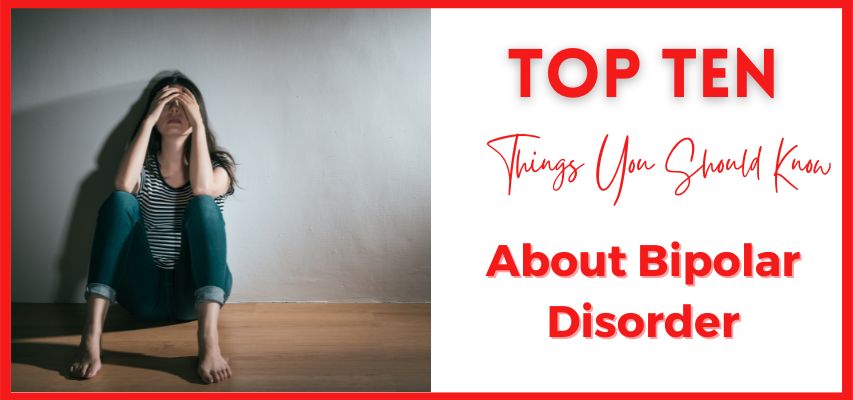Millions of people around the world suffer from bipolar disorder, also known as manic depression, which is a complicated mental health problem. Extreme mood swings, including times of high enthusiasm and energy (mania) and times of deep sadness and hopelessness (depression), are what define it. It is important to better understand this illness because these mood swings can be detrimental to daily life and interpersonal relationships. To increase knowledge and understanding, in this article, we will explore ten key features of bipolar disorder. We do this by offering information, data, and answers to frequently asked questions.
Bipolar disorder (formerly called manic-depressive illness or manic depression) is a mental illness that causes unusual shifts in a person’s mood, energy, activity levels, and concentration. These shifts can make it difficult to carry out day-to-day tasks.
When you become depressed, you may feel sad or hopeless and lose interest in or pleasure in most activities. When your mood changes to mania or hypomania (less extreme than mania), you may feel euphoric, full of energy, or unusually irritable. These mood swings can affect sleep, energy, activity, judgment, behavior, and the ability to think clearly.
Episodes of mood swings may occur infrequently or several times a year. While most people experience some emotional symptoms between episodes, some may experience none.
Also, read: Ten Tips For A Good Night’s Sleep
Bipolar Disorder Unveiled: Ten Key Points Everyone Should Know
Although this disorder is a lifelong condition, you can manage your mood swings and other symptoms by following a treatment plan. In most cases, bipolar disorder is treated with medication and psychological counseling (psychotherapy).

1. Types of Bipolar Disorder
There are several types of bipolar disorder. All types involve clear changes in mood, energy, and activity levels. These moods range from periods of extremely “up,” elated, irritable, or energized behavior (known as manic episodes) to very “down,” sad, indifferent, or hopeless periods (known as depressive episodes). Less severe manic periods are known as hypomanic episodes.
- Bipolar I disorder is characterized by severe manic episodes that may last at least seven days or require hospitalization. Depressive episodes lasting approximately two weeks may also occur. At least one manic episode has occurred, which may precede or follow hypomanic or major depressive episodes. In some cases, mania can cause an interruption of reality (psychosis).
- Bipolar II Disorder: marked by less severe manic episodes, known as hypomania, and more prolonged periods of depression. You’ve had at least one major depressive episode and at least one hypomanic episode, but you’ve never had a manic episode.
- Cyclothymic Disorder: It involves numerous periods of hypomania and mild depression, lasting for at least two years (one year for children and adolescents).
- Other types: These include, for example, bipolar and related disorders caused by certain drugs or alcohol or as a result of a medical condition such as Cushing’s disease, multiple sclerosis, or type 2 stroke.
Also, read: Top Ten Strategies to Overcome Secondary Traumatic Stress
2. Prevalence and Impact Bipolar:
The disorder affects people of all ages, genders, and backgrounds. According to the World Health Organization (WHO), approximately 60 million people worldwide suffer from bipolar disorder. The impact of this condition on individuals and society is significant, with significant healthcare costs, reduced productivity, and potential problems maintaining relationships and employment.
Also, read: Top Ten strategies for coping with stress
3. Causes and Risk Factors
- Biological factors: Genetics play a significant role, as individuals with a family history of bipolar disorder have a higher risk of developing the condition. In addition, an imbalance of brain chemicals (neurotransmitters) may also be involved.
- Environmental factors: Traumatic experiences, major life changes, and chronic stress can trigger bipolar disorder in susceptible individuals.
- Brain structure: Some research suggests that abnormalities in the structure and functioning of the brain may be associated with bipolar disorder.
Also, read: Ten Spiritual Facts to Deepen Your Inner Journey
4. Common Symptoms
Manic Episode:
- Abnormally positive, nervous, or wired
- Increased activity, energy, or excitement
- An exaggerated feeling of well-being and self-confidence (euphoria)
- Unusual talkativeness
- Distractibility
- Bad decisions, such as shopping, sexual risk, or foolish investments
- High spirits and extreme happiness.
- Rapid speech and racing thoughts.
- Reduced need for sleep.
- Impulsive behavior and poor judgment.
- Grandiose conviction and increased self-confidence.
Depressive Episode:
- Depressed mood, such as feeling sad, empty, hopeless, or crying (in children and adolescents, depressed mood may appear as irritability),
- A marked loss of interest or feeling of no pleasure in all—or almost all—activities
- Significant weight loss while not dieting, weight gain, or decreased or increased appetite (in children, the expected lack of weight gain may be a symptom of depression)
- Either insomnia or oversleeping
- Either restlessness or sluggish behavior
- Fatigue or loss of energy
- Feelings of worthlessness or excessive or disproportionate guilt
- Decreased ability to think or concentrate, or indecisiveness
- Thinking about, planning, or attempting suicide
- Loss of interest in activities that were once enjoyed.
- Fatigue and reduced energy.
- Changes in appetite and weight.
- Difficulty concentrating and making decisions.
Also, read: Ten reasons to eat fruits and vegetables
5. Diagnosis and Treatment
Diagnosing bipolar disorder involves a thorough evaluation of the person’s medical history, symptoms, and family history. Mental health professionals, such as psychiatrists and psychologists, conduct assessments to make an accurate diagnosis.
Effective treatment for bipolar disorder usually involves a combination of:
- Medications: Mood stabilizers, antipsychotics, and antidepressants may be prescribed to manage symptoms and stabilize mood swings.
- Psychotherapy: Cognitive-behavioral therapy (CBT), psychoeducation, and interpersonal therapy can help individuals cope with the challenges of bipolar disorder and improve their overall well-being.
- Lifestyle changes: Adopting a healthy lifestyle with regular exercise, a balanced diet, adequate sleep, and stress management can complement treatment.
Also, read: Top 10 ways to connect with spirituality
6. Challenges in managing bipolar disorder
Living with bipolar disorder can be challenging for the individual and their loved ones. Some of the common problems include:
- Medication Adherence: Adherence to prescribed medications can be difficult during periods of mania, when individuals may believe they no longer need treatment.
- Recognizing Mood Changes: Identifying the onset of manic or depressive episodes can be difficult, so individuals need to monitor their moods and seek support when needed.
- Stigma and misunderstanding: The stigma associated with mental health conditions can prevent individuals from seeking help and support from others.
Also, read: Ten Facts about Physical Health
7. Impact on Relationships
Bipolar disorder can significantly affect relationships with family, friends, and romantic partners. Erratic behavior during manic episodes and withdrawal during depressive episodes may lead to misunderstandings and strain in relationships. Open communication, education about bipolar disorder, and support from loved ones can play a vital role in managing these challenges.
Also, read: Top 10 Things to Know About Zurzuvae, the New Fast-Acting Pill for Postpartum Depression
8. Addressing Suicidal Thoughts
- Individuals with bipolar disorder may have suicidal thoughts during depressive episodes. It is crucial to take any suggestion of suicide seriously and seek professional help immediately. If you or someone you know is struggling with suicidal thoughts, contact a mental health professional or helpline immediately.
- Bipolar disorder has the highest suicide rate of any mental disorder. This rate is about 10 to 30 times higher in people living with bipolar disorder than in the general population.
- Up to 60% of people with this disease have tried to end their life at least once.
- However, the symptoms of bipolar disorder vary from person to person, and not everyone with the condition will think about or attempt suicide.
- “Self-harm is highest in individuals [living with bipolar disorder] who have the personality trait of impulsivity,” explains Stephanie Wijkstrom, a professional mental health counselor in Pittsburgh.
- The more impulsive someone with the condition is, the more likely they are to engage in suicidal thoughts and self-harm, she adds.
- Impulsivity is usually associated with episodes of mania. However, it can also manifest itself in phases of depression. During these depressive episodes, suicidal thoughts are more common.
- For this reason, Trusted Source research suggests that suicidal thoughts are more likely to recur in people living with bipolar II disorder, which involves longer episodes of depression.
- It is important to keep in mind that impulsivity alone is not a predictive factor for suicidal thoughts or attempts.
- In a recent study, researchers found that impulsivity was not a major factor in suicidal ideation in people with bipolar disorder. Still, it could play a role when other personality traits, such as high empathy and substance use disorder,r are present.
Also, read: Top 10 Side Effects of Zurzuvae, the New Fast-Acting Pill for Postpartum Depression
9. Coping Strategies
- Surrounding yourself with understanding and supportive individuals can provide comfort during difficult times.
- Establishing a daily routine can help stabilize mood swings and provide a sense of structure.
- Being aware of triggers that can worsen mood swings can help individuals take preventive measures.
- Substance use can worsen the symptoms of bipolar disorder, so it is essential to avoid alcohol and drugs.
- Work with your healthcare provider to develop a treatment plan and stick to it. Treatment is the best way to start feeling better.
- Follow the treatment plan as directed. Work with your healthcare provider to adjust the plan as needed.
Structure your activities. Try to have a routine for eating, sleeping, and exercising. - Try regular, vigorous exercise, such as running, swimming, or cycling, which can help with depression and anxiety, promote better sleep, and support the health of your heart and brain.
- Track your moods, activities, and overall health and well-being so you can recognize your mood swings.
- Ask trusted friends and family members to help you stick to your treatment plan.
- Be patient. Improvement takes time. Staying connected with sources of social support can help.
Also, read: Top Ten Foods to Boost Your Immune System Naturally
10. Prognosis and Hope
While this disorder is a lifelong condition, with proper management and treatment, individuals can lead fulfilling lives. With ongoing support from healthcare professionals, loved ones, and self-care practices, those with bipolar disorder can find hope, stability, and improved quality of life.
Also, read: Top Ten Healthiest Fruits
FAQs: Bipolar-Disorder
Q: Can bipolar disorder be cured?
Bipolar disorder cannot be cured, but it can be effectively managed with a combination of medications, therapy, and lifestyle changes.
Q: Can children have bipolar disorder?
Yes, children and adolescents can develop bipolar disorder. It is often challenging to diagnose in young individuals due to overlapping symptoms with other conditions.
Q: Is bipolar disorder hereditary?
There is a genetic component to bipolar disorder, meaning individuals with a family history of the condition may have a higher risk of developing it.
Also, read: Ten Best Ways to Prevent Lifestyle Diseases
Q: Can people with bipolar disorder work and have successful careers?
Yes, with proper treatment and support, individuals with bipolar disorder can have successful careers and lead fulfilling lives.
Q: Is it safe to stop medication during a stable period?
It is essential to consult with a healthcare professional before making any changes to medication. Abruptly stopping medication can lead to a relapse or worsening of symptoms.
Conclusion
Bipolar disorder is a complex mental health condition that affects millions of individuals worldwide. Understanding the different types, symptoms, and issues associated with this disorder is essential to promoting awareness and support for those affected. With early diagnosis, proper treatment, and a support network, individuals with bipolar disorder can lead fulfilling lives and find hope on their journey to stability and well-being.


































